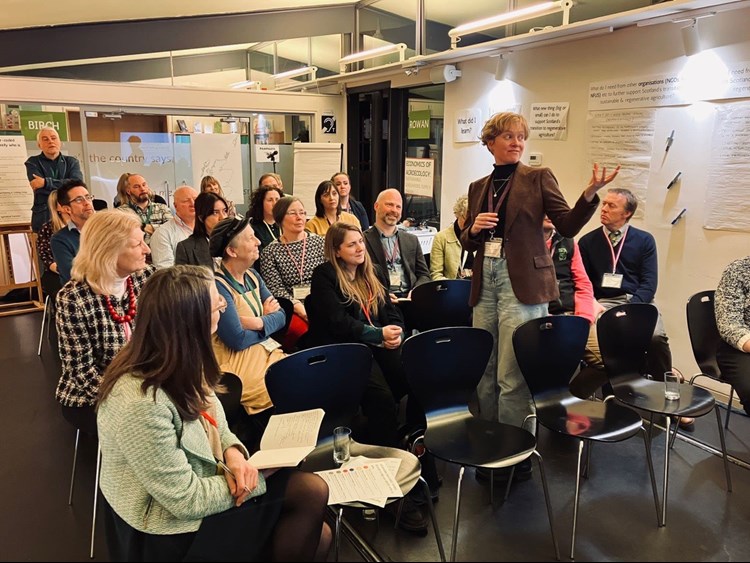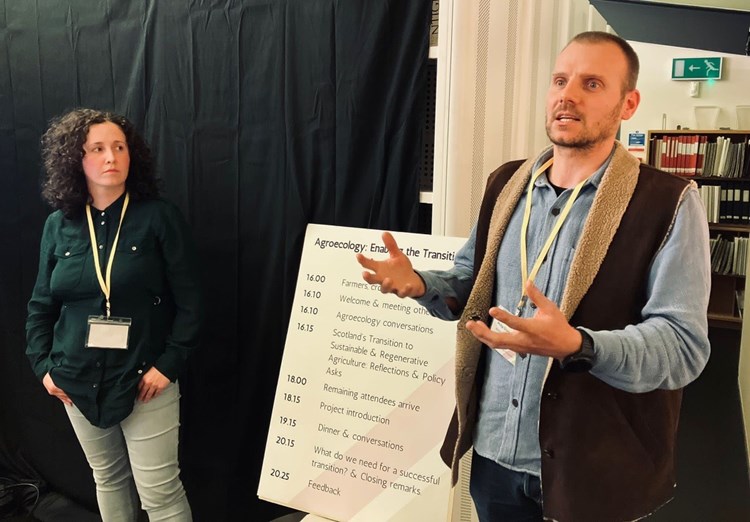Agroecology: Enabling the Transition
The final meeting of this year’s Scottish Government-funded KTIF programme Agroecology: Enabling the Transition, took place on 22 March 2023.
Project participants from the six different regions as well as policymakers, came together for the first time to share experiences and explore how to support and escalate a transition to agroecology across Scotland.
For the past eight months, farmers, crofters, and growers across Scotland have been coming together in six small regional groups to share knowledge on agroecological practices. Last Wednesday (22 March) the different groups finally came together at our final Agroecology: Enabling the Transition meeting (find out more about the programme on the project’s official website).

The event – jointly organised and facilitated by Nourish Scotland, Soil Association, Nature-Friendly Farming Network, Pasture for Life, Propagate and Landworkers' Alliance – took place in the Scottish Poetry Library in Edinburgh. Farmers, crofters and growers from across Scotland came together to share learnings and present key policy asks to the Scottish Government. There was also time to talk and exchange experiences around the brilliant food provided by Edinburgh Food Social!
During the evening the participants shared learnings from the programme, reflected on their current farming practices and had conversations around the economics of agroecology, high nature value farming and rethinking inputs; exploring why these topics were important, what could be learnt on the topic from peer-to-peer spaces, and what challenges and opportunities were associated with it.

After that, we welcomed policy makers and other organisations. Group representatives showcased each groups’ work, and presented their policy asks: maintaining programmes where farmers, crofters and growers learn from and support each other; creating and supporting apprenticeship & training schemes for agroecological growers; making scheme application easy to access and user-friendly; addressing the urgent need for local abattoirs; and ensuring a closer integration between peer-to-peer groups and policymakers, potentially appointing a facilitator “to be part of groups like ours and shorten the line of communication between small scale producers and Policy and get our voices heard”. The groups also invited policymakers to visit their operations to better understand what they do.
This was followed by a meal where participants explored different aspects of how we can work together towards Scotland’s transition to agroecology and regenerative agriculture.
Ariane Burgess, MSP for the Highlands and Islands, hosted the event and said: 'Knowledge Transfer projects like this help to show the way. We want to know what support is needed by farmers, crofters and growers. And we want to learn from you this evening!'
Pete Ritchie highlighted in the event’s closing remarks: “We’re people who need to work with a sense of autonomy and pride in what we do. And we’re people who are continuously learning (…) Policy has to be about creating a framework in which farmers, crofter and growers can feel respected and valued and keep on learning”.
Farmers and crofters from a range of system types – regenerative, conventional, organic, agroecological – have been part of this peer-to-peer learning programme, going on farm walks, sharing lunch and having conversations with agroecological experts. The diverse background of group members has contributed to rich discussions and learning opportunities for all.
Keep an eye on the project’s official website to keep up to date with project news, webinar recordings and resources!
Do you have any comments or questions? Please feel free to contact Ana.
Photographs: Clem Sandison

